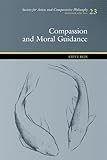Compassion and Moral Guidance / Steve Bein.
Material type: TextSeries: Monographs of the Society for Asian and Comparative PhilosophyPublisher: Honolulu : University of Hawaii Press, [2013]Copyright date: ©2013Description: 1 online resource (224 p.) : 3 illusContent type:
TextSeries: Monographs of the Society for Asian and Comparative PhilosophyPublisher: Honolulu : University of Hawaii Press, [2013]Copyright date: ©2013Description: 1 online resource (224 p.) : 3 illusContent type: - 9780824836412
- 9780824837211
- BJ1475
- online - DeGruyter
- Issued also in print.
| Item type | Current library | Call number | URL | Status | Notes | Barcode | |
|---|---|---|---|---|---|---|---|
 eBook
eBook
|
Biblioteca "Angelicum" Pont. Univ. S.Tommaso d'Aquino Nuvola online | online - DeGruyter (Browse shelf(Opens below)) | Online access | Not for loan (Accesso limitato) | Accesso per gli utenti autorizzati / Access for authorized users | (dgr)9780824837211 |
Browsing Biblioteca "Angelicum" Pont. Univ. S.Tommaso d'Aquino shelves, Shelving location: Nuvola online Close shelf browser (Hides shelf browser)

|

|

|

|

|

|

|
||
| online - DeGruyter No Na Mamo : Traditional and Contemporary Hawaiian Beliefs and Practices / | online - DeGruyter I Ulu I Ke Kumu : The Hawai'inuiākea Monograph / | online - DeGruyter Celebrity Gods : New Religions, Media, and Authority in Occupied Japan / | online - DeGruyter Compassion and Moral Guidance / | online - DeGruyter An American Girl in the Hawaiian Islands : Letters of Carrie Prudence Winter, 1890-1893 / | online - DeGruyter Sword of Zen : Master Takuan and His Writings on Immovable Wisdom and the Sword Taie / | online - DeGruyter Making Faces : Self and Image Creation in a Himalayan Valley / |
Frontmatter -- Contents -- Abbreviations Of Works Cited -- Introduction -- Chapter One: What Is Compassion, And What Is It Not? -- Chapter Two: What Is The Com- Of Compassion? -- Chapter Three: Defining Compassion -- Chapter Four: Objections To An Ethic Of Compassion -- Chapter Five: Compassion In Action -- Notes -- Literature Cited -- Index
restricted access online access with authorization star
http://purl.org/coar/access_right/c_16ec
Compassion is a word we use frequently but rarely precisely. One reason we lack a philosophically precise understanding of compassion is that moral philosophers today give it virtually no attention. Indeed, in the predominant ethical traditions of the West (deontology, consequentialism, virtue ethics), compassion tends to be either passed over without remark or explicitly dismissed as irrelevant. And yet in the predominant ethical traditions of Asia, compassion is centrally important: All else revolves around it. This is clearly the case in Buddhist ethics, and compassion plays a similarly indispensable role in Confucian and Daoist ethics.In Compassion and Moral Guidance, Steve Bein seeks to explain why compassion plays such a substantial role in the moral philosophies of East Asia and an insignificant one in those of Europe and the West. The book opens with detailed surveys of compassion's position in the philosophical works of both traditions. The surveys culminate in an analysis of the conceptions of self and why the differences between these conceptions serve either to celebrate or marginalize the importance of compassion.Bein moves on to develop a model for the ethics of compassion, including a chapter on applied ethics seen from the perspective of the ethics of compassion. The result is a new approach to ethics, one that addresses the Rawlsian and Kantian concern for fairness, the utilitarian concern for satisfactory consequences, and the concern in care ethics for the proper treatment of marginalized groups. Bein argues that compassion's capacity to address all of these makes it a primary tool for ethical decision-making.
Issued also in print.
Mode of access: Internet via World Wide Web.
In English.
Description based on online resource; title from PDF title page (publisher's Web site, viewed 02. Mrz 2022)


